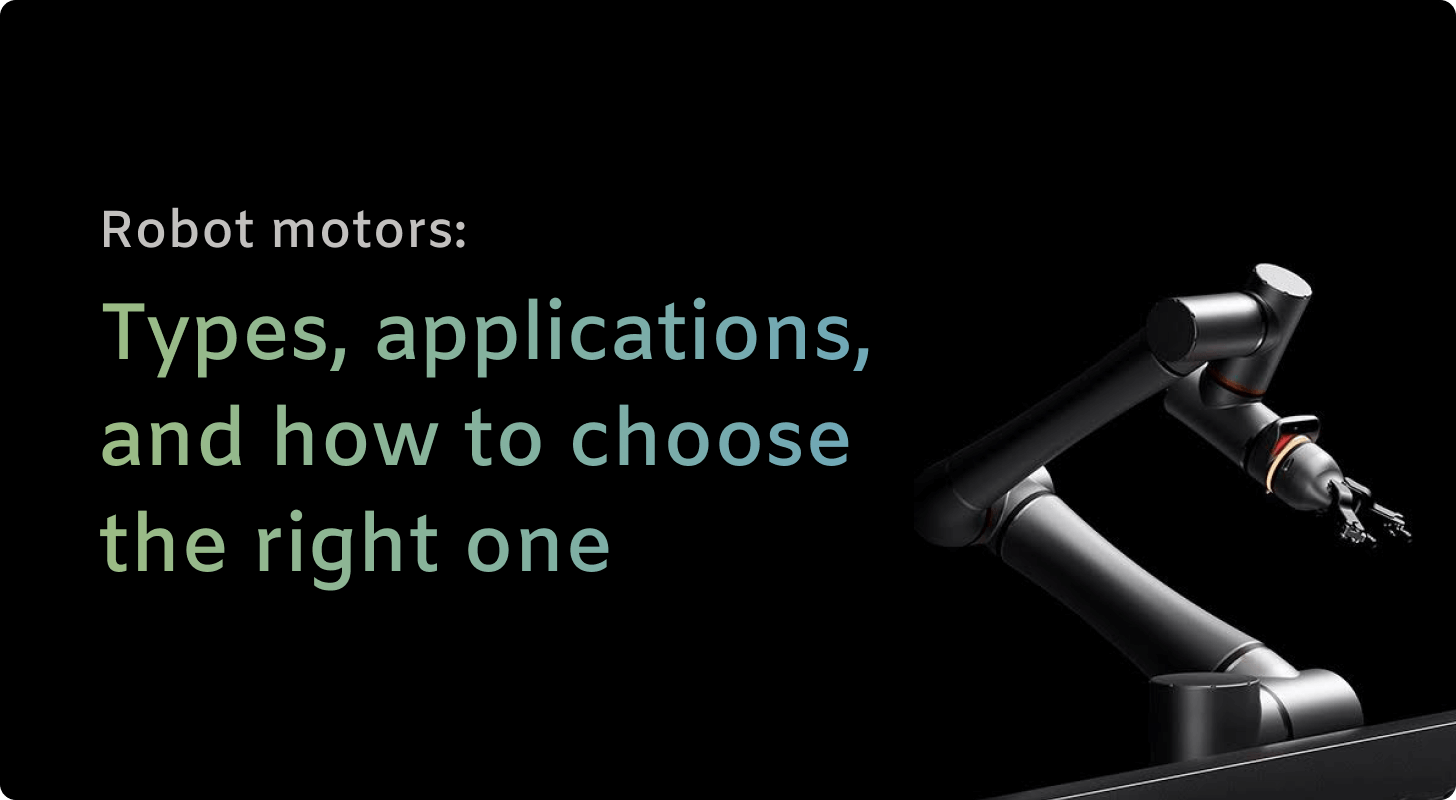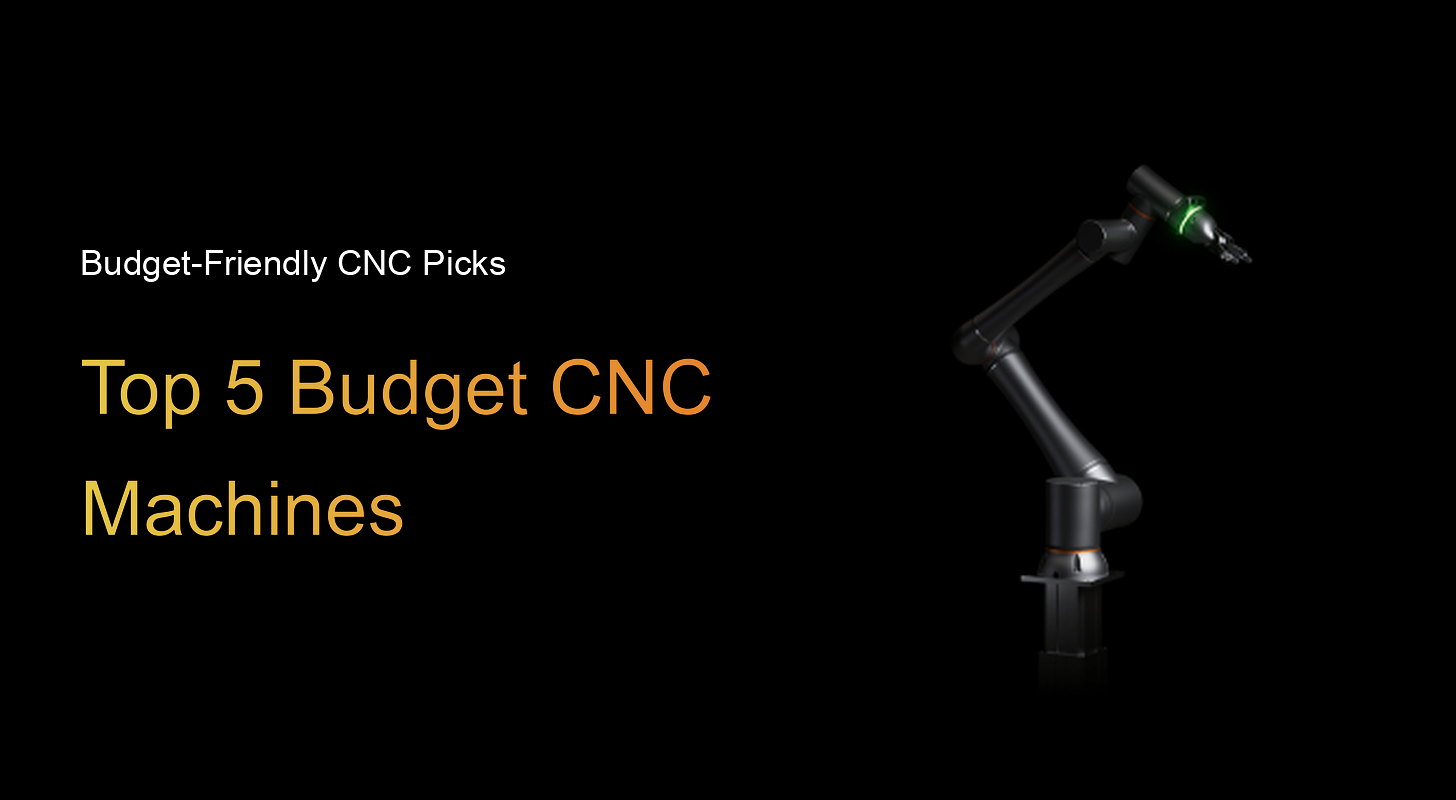Ever wish you could give your employees' arms a break? Meet the factory robot arm - your new mechanical helping hand.
In this article, we’ll learn all there is to know about how these robotic arms can be a huge help to your shop floor.
We’ll cover:
- What is a factory robot arm?
- What can factory robot arms do in your factory?
- Is your factory ready for a robot arm?
- The top 10 robot arm manufacturers
Ready? Let’s dive in!
What is a factory robot arm?
A factory robot arm is a robotic manipulator designed to automatically handle materials or perform assembly tasks in a manufacturing environment.
These highly programmable, advanced machines are made up of multiple joints that provide precise control of an “end-effector” - typically a gripper or tool that interacts with the workspace.
These robot arms are powered by electric motors in each joint and controlled by an onboard computer.
The computer is pre-programmed with the movements needed to complete a task, like picking up an object, moving it, and putting it down. Sensors provide feedback to make sure that the arm’s position and movement are accurate.
Some cutting-edge arms have vision systems or sensors to detect objects' position and orientation, enabling more complex manipulation and assembly tasks.
The end-effector can be equipped with various tools, allowing the robot to perform actions like CNC machine tending, pick and place, welding, and much more.
Finally, the two most common types are Articulated robot arms, which have rotary joints that allow movement in multiple planes, and Cartesian (or Gantry) robot arms that move along an X, Y, and Z axis.
Of course, Articulated arms offer more flexibility while Cartesian arms typically have a larger range of motion.
What can factory robot arms do in your factory?
So, what can these robots do on the factory floor? Quite a lot, actually.
Let’s take a look:
- Assembly work: Robot arms are major players in assembling products; they handle tasks like fitting parts together, welding, or gluing with accuracy and efficiency, making them indispensable on the production line.
- Packaging processes: Factory robot arms are adept at picking, sorting, and placing products into boxes, adding seals and labels, and preparing items for shipment.
- Handling materials: In the environment of manufacturing, robot arms move heavy and bulky items around easy peasy. From unloading pallets to transferring materials between workstations, they keep things running smoothly.
- Quality inspection: Equipped with advanced vision systems and sensors, robot arms play a major role in inspecting products. They scan for flaws, ensure proper assembly, and identify any imperfections, contributing to quality control efforts.
Is your factory ready for a robot arm?
Robot arms can help you make tremendous productivity gains – but only if your operation is ready to properly use one.
Before investing in an Industrial robot arm, assess if your factory meets these key requirements:
- Staff training: Even though robot arms automate tasks, they need skilled technicians for programming, operation, and maintenance. It’s important to either hire staff with the right technical background or invest in training programs. Skipping on proper training can lead to inefficiencies – and potential safety risks.
- Adaptable workflow: The flexibility of robot arms means they can handle a variety of tasks, but fitting them into your operations might require some adjustments; factory managers should plan on how to integrate these arms into their current setup to get the best productivity boost. At the end of the day, this might mean streamlining certain processes or reshuffling tasks among the team.
- Proper safety precautions: Introducing robot arms means bringing in equipment that moves quickly and forcefully. It’s extremely important to have safety measures in place like emergency stops, protective barriers, and designated areas for robot work. Make sure everyone is up to speed before implementation.
What should you look for in a factory robot arm?
Choosing a robot arm for your factory floor is an important decision – one that you shouldn’t take lightly.
Several factors should influence your choice:
- What’s the payload? The weight a robot arm can lift is critically important. With capacities ranging from a few kilos to over 500 kilograms for the more robust models, going with a model that meets the demands of your tasks is essential.
- How many degrees of freedom does the arm have? The arm's reach and flexibility, determined by its length and the number of joints, affect its ability to access different areas. Your workspace layout will dictate the reach and degrees of freedom needed to perform tasks effectively.
- How fast is it? The operation speed and accuracy of the robot arm are the way for you to meet your production goals. While some arms are designed for rapid, high-volume tasks, others prioritize precision for tasks requiring careful handling.
- Have you thought about durability? The build quality of a robot arm is important, especially in tough factory conditions. Look for arms designed for durability and easy maintenance to minimize downtime. Models with modular components often have more straightforward servicing and potentially lower overall costs.
- How easy is it to integrate and program? Compatibility with your current systems is a must. First, check if the robot arm integrates easily with your software and equipment, like conveyor belts and vision systems. Also, consider the level of programming support offered by the manufacturer to facilitate a smooth setup process.
The top 10 manufacturers of factory robot arms
So many manufacturers to choose from, and so little in the way of actual knowledge. But, we’re here so you don’t have to risk falling for all of the marketing spiel.
Here are the top 10 factory robot arm manufacturers in 2024:
Standard Bots
Standard Bots, an American company based in Glen Cove, New York, stands out in the robotics industry by prioritizing ease of use and affordability.
Their mission? To democratize robotics by making them accessible to a wider range of businesses and individuals, particularly within the manufacturing sector.
Their flagship product, RO1, is a Six-Axis AI-powered Collaborative robot arm designed with user-friendly software and a straightforward setup.
ABB
ABB is a Swiss-Swedish multinational corporation headquartered in Zurich, Switzerland, that operates mainly in robotics, power, heavy electrical equipment, and automation technology areas.
To date, ABB has installed over 300,000 robots worldwide, more than any other company.
Yaskawa Motoman
Yaskawa Electric Corporation is a Japanese company founded in 1915 (total pioneers!) that manufactures Industrial robots, automotive equipment, and other automation products.
Their Motoman robotics division is a leading robotics company, with hundreds of thousands of Motoman robots installed worldwide.
FANUC
FANUC is a huge Japanese multinational corporation that specializes in automation, including robotics.
FANUC is the world's largest maker of Industrial robots, with over 4 million robots installed worldwide.
Their robots are used for applications like welding, painting, assembly, pick and place, testing, and packaging.
KUKA
KUKA is a German manufacturer of Industrial robots and solutions for factory automation.
KUKA Robotics has installed over 80,000 robots worldwide in a variety of industries including automotive, electronics, metal and machining, plastics, and food and beverages.
Epson Robots
Epson Robots is the robotics division of Seiko Epson Corporation, a Japanese electronics company.
They make high-quality SCARA and Six-Axis robot arms, known for their high performance, low cost, and ease of use.
In 2024, over 70,000 Epson robots will have been installed worldwide.
Omron Adept
Omron Adept Technologies is an American Industrial robotics company and a subsidiary of Japanese electronics company Omron.
Omron Adept makes advanced SCARA, Parallel and Collaborative robot arms for high-speed pick and place, assembly, and packaging applications.
Over 25,000 Omron Adept robots have been deployed worldwide.
Denso Wave
Denso Wave is a subsidiary of Japanese automotive component manufacturer Denso Corporation.
They specialize in factory automation equipment like Industrial robots, automated guided vehicles, and barcode readers.
Their Industrial robots are used for welding, assembly, and other applications in the automotive industry. Over 170,000 Denso robots have been installed worldwide.
Stäubli Robotics
Stäubli Robotics, a subsidiary of the Swiss Stäubli Group, established in 1982, has carved a niche in the robotics industry with its expertise in high-performance, Six-Axis Articulated robot arms.
They cater to diverse industries, including automotive, aerospace, electronics, and food and beverage, offering a comprehensive range of robots tailored to specific application needs.
Nachi Fujikoshi
Nachi Fujikoshi, founded in 1928 and headquartered in Toyama, Japan, is a big name in the robotics industry, known for its extensive range of Industrial robots and automation systems.
Their product lineup includes a variety of robot arms suited for welding, cutting, handling, and assembling applications, emphasizing durability, reliability, and high performance.
Nachi Fujikoshi has successfully installed tens of thousands of robots worldwide, supporting industries in achieving operational excellence and technological advancement.
FAQs
What are the common applications of factory robot arms?
The most common uses are:
- Assembly: Robot arms assemble product parts efficiently and with precision. They can handle repetitive tasks without fatigue.
- Welding: Robot arms are able to weld parts together quickly and with high precision. They can access hard to reach areas and improve safety by reducing human exposure to welding fumes.
- Painting: Robot arms equipped with spray guns can paint products uniformly and consistently. They improve quality and reduce waste.
- Packaging: Robot arms are adept at picking and placing products into packaging at high speeds. They help automate the packaging process.
- Palletizing: Robot arms can lift and stack boxes, crates or other products onto pallets for storage or shipping. They make the palletizing process faster and less labor-intensive.
How much do factory robot arms cost?
The cost of a factory robot arm can range from $2,000 up to $500,000 or more, depending on its capabilities and features. In general:
- Smaller robot arms with limited range of motion and payload capacity are on the lower end of the price range. They are good for simple, repetitive tasks.
- Larger robot arms that can handle heavy payloads have a wide range of motion and more advanced features like vision guidance systems are at the higher end of the price spectrum. They are suitable for complex manufacturing operations.
Summing up
You now have all the info you need to decide if a factory robot arm is right for your manufacturing operation.
But not all robot arms are created equal, so do your homework on the leading manufacturers, shop around, and you’ll find the right fit in no time!
Next steps
Dive into the future of shop floor automation with RO1 from Standard Bots, merging AI with autonomous robotics in a way that's ideal for both innovative startups and established industrial giants.
- Cost-effective titan: The RO1 isn't only about leading-edge technology; it's also about making advanced automation affordable. At a price point that's half that of similar offerings, it brings cutting-edge automation within reach of businesses at any stage of development.
- High-performance, high-accuracy: RO1 sets the standard, not just competes. With an 18 kg payload capacity, it surpasses its competition in both speed and precision, enhanced by self-learning technology on par with the GPT-4.
- Collaborative: Safety is a core feature of the RO1, equipped with comprehensive sensors and collision prevention systems to ensure a safe and efficient operation, even in the most dynamic factory settings.
Interested in exploring how the RO1 melds the flexibility of AI with the power of a factory robot arm? Contact us for a complimentary, 30-day trial at your facility.
brighter future
Join thousands of creators
receiving our weekly articles.










